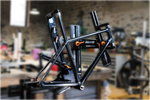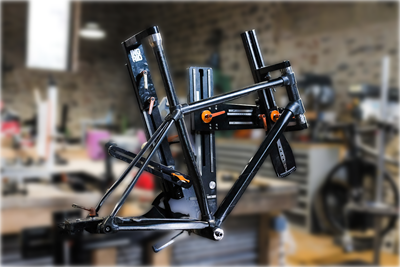Canyon Bicycle FRP handlebars optimized via fully integrated injection molding system by Engel
Engel tie-bar-less Victory 180 and partner support has created a completely automated production environment for manufacturing hollow composite bicycle components quickly and efficiently.
Highly integrated production cell from Engel for an innovative bicycle handlebar by Canyon Bicycles. Source (All Images) | Engel
Engel’s (Schwertberg, Austria) tie-bar-less Victory 180 injection molding technology and partner expertise supports new production possibilities for fiber-reinforced bicycle parts with fully integrated automation. A handlebar, recently manufactured for customer Canyon Bicycles GmbH (Koblenz, Germany) further highlights this high-performance, lightweight production capability.
The Victory 180 combines a process for manufacturing hollow components via Engel fluidmelt technology and the simultaneous integration of glass fiber reinforcement. In the fluidmelt process, the molten core of a component is displaced during the cycle — either into an overflow cavity or back into the plasticizing unit — using water or nitrogen. This creates a hollow section within the part. The geometry of the component further enables the production of lightweight structures that still exhibit high bending and torsional stiffness. Once the cooling phase is complete, the component — in this case a hollow handlebar — is removed from the mold with an articulated robot.
The handlebars are glass fiber-reinforced PA6. In addition, they are reinforced with four unidirectional carbon fiber tapes, which are bonded during the injection molding process. This combination enables high rigidity and structural stability, despite low wall thicknesses and a hollow cross-section.
According to Engel, what was previously a labor- and energy-intensive process for Canyon Bicycles can now be completed in just 1 minute as part of a mass production process. The fully automated production process enables immediate usability without the need for postprocessing, while reducing the CO₂ footprint through targeted material use and full recyclability. The result is a component that delivers maximum functionality and matches the performance of aluminum.
“This combination of technologies reduces weight while offering high stability, geometric design freedom and the ability to integrate features such as cable routing or display mounts directly into a single production process,” says Paul Zwicklhuber, technology manager for lightweighting solutions at Engel. “That significantly lowers production costs and the carbon footprint, making manufacturing in Europe economically attractive again.”
The tie-bar-less design of the Engel Victory series offers an expanded mold space to enable the use of large and complex components or molds, all while maintaining a compact machine footprint. This makes it ideal for demanding geometries such as Canyon’s bicycle handlebar. The machine’s wide-platen variant features enlarged mounting platens, providing an additional 100 millimeters in width compared to standard models. As long as no higher clamping force is required, this design eliminates the need to invest in a larger machine, Engel says.
For this project, Canyon Bicycles played a central role in the development of the new handlebar. The company contributed its expertise to the conceptual and functional design, ensuring that the component meets the exacting demands of cyclists who demand the quality components. Artefakt Design (Darmstadt, Germany) was responsible for the aesthetic design of the handlebar, developing a concept that is not only functional but also visually appealing, ensuring it integrates seamlessly into the modern appearance of Canyon bicycles. Domo Chemicals (Ghent, Belgium) supplied the injection molding compound and the necessary tapes for production, and Plastic Innovation GmbH (Ottensheim, Austria) was responsible for the mechanical component design, as well as the process and structural simulation. Finally, Simoldes (Oliveira de Azeméis, Portugal) was the contributed its extensive expertise in mold manufacturing and component production to ensure the high quality and reproducibility of the handlebar manufacturing process.
Read Next
Proving thermoplastic composites match carbon fiber/epoxy performance in road bikes
CDCQ, LxSim, Addcomp and Argon 18 collaborate to optimize a carbon fiber/PA6 bike seat post, democratizing AFP and demonstrating materials and process for future designs and production.
Read MoreThermoplastic composite, tube-shaped preforms for large-volume manufacturing
Starting with the sporting goods and bicycle market, French startup 3DiTex targets its continuous preforming system for thermoformable, thermoplastic composite tubes in complex geometries.
Read MoreEngel supports composites upcycling research at TH Rosenheim
Engel Group has provided the Rosenheim University of Applied Sciences with a vertical injection molding machine for further R&D into the processing of thermoplastic, recyclable composites and the application of natural fibers.
Read More

























